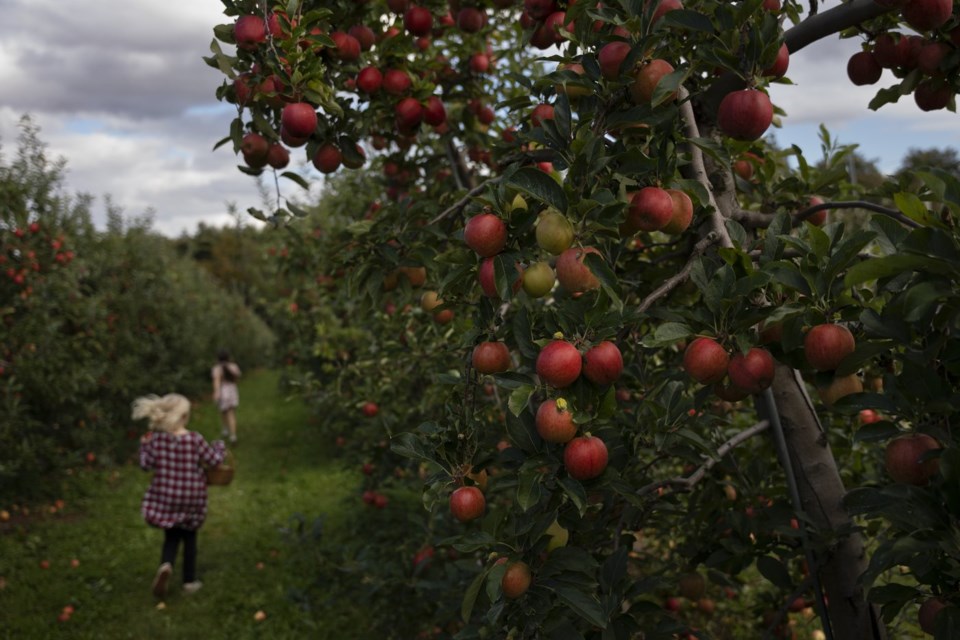With less than a week to go before gala apples will be ready to be picked in British Columbia, the president of the provincial fruit growers' group worries about a devastating season without a way for farmers to refrigerate their crops.
Peter Simonsen of the BC Fruit Growers' Association says without infrastructure provided by the BC Tree Fruits Cooperative, which abruptly closed last month, some growers might find that it's not worth picking their fruit, leaving it to rot in the orchard.
"There's going to be a carpet of apples," he said.
Last month, the BC Tree Fruits Cooperative announced that "extremely low" volumes of fruit and difficult market conditions led to the decision to close and it would be going to court to wind down the organization.
Industry representatives, political rivals and those growing the fruit have since called on the provincial government to step in and maintain some of what the co-op left behind, particularly the cold storage, which allows galas to last for up to 10 months before being sold.
"There's no shame in us asking for the government just to keep it open. Just keep it open for a few months. You know, pay the money to run the storage, to get the fruit into storage, and then there's time to … figure out who can pack it and where it can go, and do that kind of thing," Simonsen said.
"But I'll tell you unequivocally, they are not listening to us. They are simply not listening and it's a huge source of frustration."
In response to the co-op's closure, B.C. Agriculture Minister Pam Alexis tasked an emergency group to come up with solutions, including how to gain access to packers and food-safety certification for export purposes, which the co-op had provided.
Alexis said in an interview Friday that the government will have news "soon" on its next steps, but said private companies have enough capacity and storage to make up for the loss of the co-op.
"That's what I have determined in the last few days," she said.
Alexis said because of the court process, it's unlikely the government would be able to acquire the co-op's storage, even if it was something it wanted to do.
Simonsen said without the storage, growers will be forced to scramble to sell their product in September and October, driving down prices for apples.
"A significant segment of our industry is in big, big trouble. And they are very upset," he said.
The province has published a list of private packers that growers can use to try to find a place taking on fruit, and Alexis said she has heard from people who were successful.
Simonsen said he doesn't think private packers have the capacity, and that it appears a lot of B.C. fruit would have to become juice.
"And juice prices are always so low. It is just not feasible, really, to pick them," he said.
Sam DiMaria has put his name down with several independent packers to see if anyone has room for his apples, but he hasn't heard back.
DiMaria said he's confident he'll eventually find a place for his fruit but he's skeptical there will be enough room for the entire industry.
"Although there may be sufficient capacity to pack and sell the fruit, there's not enough capacity to hold the fruit in the bins because most of the bins are in the hands of the receiver from the co-op, and the cold storages. Those are the two main hurdles."
DiMaria said acquiring and running a cold storage facility would be "chump change for the government."
"If the government can help secure enough storage to hold the crop that is in excess of what the independent packers can handle, that would work," he said.
With about two months to go before the province's October election, the plight of the orchardists has become a hot-button issue for the BC United Opposition.
Kelowna-area members of the legislature and agriculture critic Ian Paton wrote to Alexis calling on the New Democrats to stop the co-op from liquidating its assets, provide emergency funding for storage, and have an independent audit to "explore viable options for transitioning the existing business to a sustainable third party."
"Swift action is required to prevent a situation where sensible, rational, and thoughtful decisions can no longer be made to mitigate the extensive and widespread damage caused by (the co-op's closure)," the letter says.
Alexis said the government does not have the legal authority to order an audit of the co-op, but it's something members could do.
The minister said her office is in conversation with "industry leaders" about what additional financial supports for growers could look like.
"No decisions have been made as of yet, but we absolutely understand the immediate financial implications. You know, it's been a very challenging three or four years for farmers in British Columbia, actually, across Canada," she said.
She said Canadian ministers agreed at a meeting earlier this year that existing support programs need to be improved.
"The news of this co-op was just horrific in the midst of harvest season," she said.
"So, you can imagine the anxiety and the stress that the farmers are going through right now. This is just some added component. So, I totally understand the issues, we are working hard together to figure it out."
This report by The Canadian Press was first published Aug. 9, 2024.
Ashley Joannou, The Canadian Press

